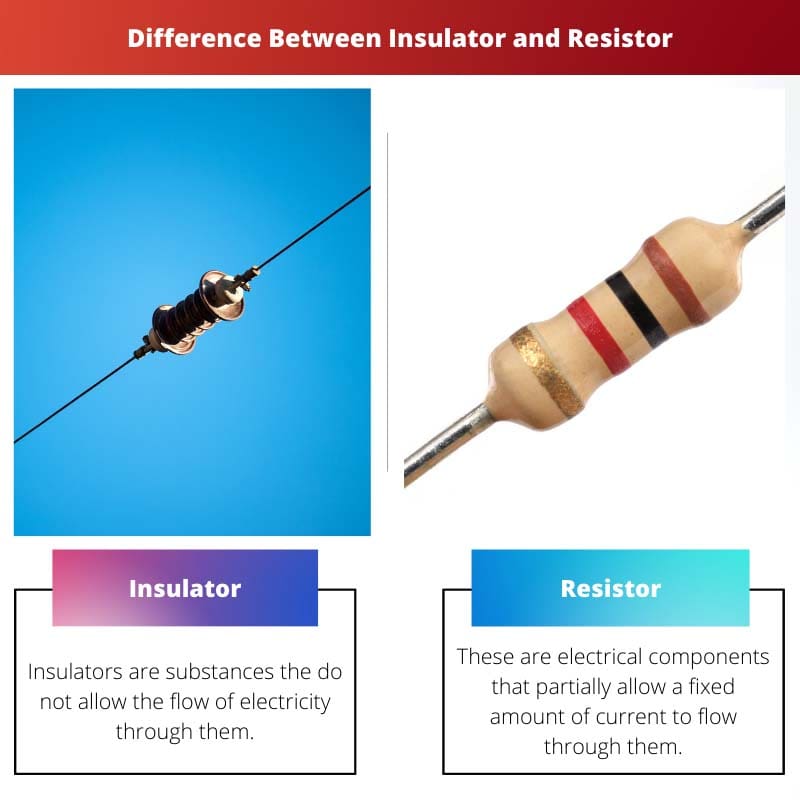In modern times, no city can function without electricity, and no house can function without electric components and appliances, which makes it necessary to know the nature and properties of electricity to understand better how to make good use of it.
Insulators and resistors are both used to control current. Electricity can be very harmful if people come in contact with it, and appliances can also get fried and catch fire if the excess current is allowed to flow to them.
Key Takeaways
- Insulators hinder the flow of electric current, while resistors control it.
- Insulators are made of materials with high resistance, such as glass and rubber; resistors are made of materials with controlled resistance, such as carbon and metal alloys.
- Insulators are used for electrical insulation and protection; resistors regulate voltage and current in electrical circuits.
Insulator vs Resistor
Insulators are materials that do not conduct electricity well and are used to separate electrical conductors to prevent unwanted electrical flow. A resistor is an electrical component that limits the flow of current in a circuit. It is made of a material with high resistance and can be fixed or adjustable.

Insulators are substances that lack or have very few free electrons, therefore, are poor conductors of electricity.
Insulation is a very necessary aspect of electrical devices since signals and currents need to be isolated to their circuits to perform well. That is why electrical wires are embedded in a rubber coating, as rubber is an excellent insulator that prevents current flow outside the circuit.
Resistors are materials and devices made using the property of certain substances that do not let electricity flow freely through them.
They regulate the current flow in a circuit by offering fixed and calculated ohms of resistance. They are important because high ampere currents can cause fires and extensive damage if allowed to flow freely.
Comparison Table
| Parameters Of Comparison | Insulator | Resistor |
|---|---|---|
| Meaning | They are used to prevent flow, heat, and electricity outside of where they are supposed to be. | These are electrical components that partially allow a fixed amount of current to flow through them. |
| Function | They control the magnitude of current flowing through a circuit, allowing only fixed current to flow. | Rubber, pure water, air, and wool are insulators. |
| Electrons | Valence shell electrons are tightly bonded with the atoms and cannot flow. | Valence shell electrons are somewhat loosely attracted, some can flow freely. |
| Material | The resistance they offer is above 20 megohms. | Materials such as carbon, ceramic, and metal oxides are resistors. |
| Resistance | Different resistors offer different resistance ranging from 1 ohm up to 10 megohms. | Different resistors offer different resistance ranging from 1 ohm all the way up to 10 megohms. |
What is Insulator?
An insulator is any substance that does not allow the flow of heat and electricity through it. They lack free electrons, it is a natural property of substances. Insulators are really important to protect humans from extreme colds as well as electric shocks.
Air, pure water, rubber, cotton, wood, plastic, etc., are excellent insulators. Therefore, insulators make clothes, wire sheaths, and walls. In the case of insulators, the valence shell electrons are tightly bonded with the atom.
The atoms have 5 to 7 electrons in their outermost shell and therefore tend to attract more electrons to achieve their nearest noble gas configuration. This prevents the electrical energy from flowing through it as there are no free electrons.
Insulators can be found everywhere in our daily lives, it is a really important property of physics, and even plants have evolved to develop insulation around themselves in hot climates to prevent excess water loss.
Materials that can trap air are excellent insulators. In general, metals are excellent conductors and poor insulators, and most non-metals are good insulators. That is why wires are made from metals, and resistors are made from ceramics and carbon.

What is Resistor?
Resistors are electrical components of carbon and ceramic powder with resin that acts as an adhesive. The magnitude of the resistance offered by different resistors depends on the carbon and ceramic ratio.
Resistors allow some calculated amount of current to flow through them and are therefore used to regulate the amount of current in a circuit.
Resistors are made up of substances with no free electrons or very tightly packed electrons that cannot be separated from the atom. Instead, these atoms want more electrons to achieve an inert state.
Resistance is defined as the property of substances under which they obstruct the flow of current. This property is used in resistors to prevent high voltage in electrical devices because it may damage them.
Resistors change obstruction in a circuit and control signal strengths, voltage division, etc. No electrical circuit board can be made efficiently without using several separate resistors in parallel or series.
In a series arrangement, resistance is added, whereas in a parallel arrangement, resistance is divided. Another appliance where resistors are the main components is a coil heater, where the filament gets very hot when current flows through it due to its high resistance.

Main Differences Between Insulators and Resistors
- An insulator is any substance that does not allow the free flow of current, whereas a resistor is a device that allows a controlled flow of current through a circuit.
- A resistor is man-made, using the property of resistance for electrical use, whereas insulation is a natural property differing between different materials.
- Resistors are used in electrical appliances such as heaters, television, microwaves, etc., and insulators coat wires, making clothes heatproof and shockproof.
- Resistors can offer resistance of any value the resistor was made for, whereas perfect insulators have an infinite resistance and allow no current flow.
- Substances like wool, cotton, air, and pure water are insulators where, whereas metalloids, carbon, and metal oxides are resistors.

- https://journals.aps.org/prb/abstract/10.1103/PhysRevB.33.3020
- http://genesdev.cshlp.org/content/16/3/271.short

Insulators and resistors are crucial components in electrical devices, and understanding their functions is fundamental for safe electrical practices. The information provided in this article is thorough and enlightening.
Insulators and resistors are incredibly important in the electrical field. It is essential for everyone to understand their properties and characteristics to work with electricity.
This article is a great reference for anyone interested in the field of electrical engineering. The comparison table provided makes it easy to distinguish between insulators and resistors.
This is an excellent explanation of the difference between insulators and resistors, providing a clear understanding of their applications.
The comparison between insulators and resistors is presented competently. However, a more in-depth exploration of their applications in electrical circuits would enrich the content.
Indeed, an expanded analysis of their applications in electrical circuits would be an enlightening inclusion in this article. It would provide a holistic understanding of the role of insulators and resistors in electrical engineering.
This article provides a comprehensive comparison of insulators and resistors. However, the explanation of their electron properties could be further developed to enhance the reader’s understanding.
I agree, a more detailed explanation of the electron properties would be beneficial. It would further contribute to the depth of understanding of these electrical components.
The electron properties explanation would be an insightful addition to this informative article. It would provide a more comprehensive understanding of the differences between insulators and resistors.